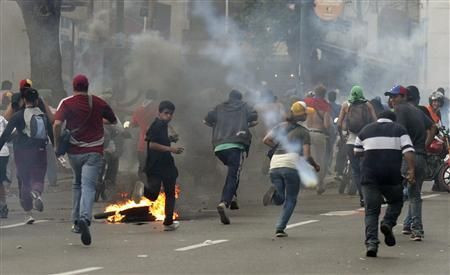
Tibisay Lucena, head of Venezuela's National Electoral Council (CNE), announced on Thursday that authorities had decided to complete a 100 percent audit of votes cast in Sunday's presidential election. 54 percent of the votes had already been audited, leaving 46 percent to be accounted for - 12,000 boxes' worth of ballots. The announcement marks a reversal for the CNE, which had previously said that no recount or audit would be carried out because the country's constitution did not permit manual recounts. Both Nicolás Maduro, who had previously been certified as the winner, and Henrique Capriles, the opposition candidate, are confident that the audit will prove them the legitimate winner.
Capriles said the true result would be "in those 12,000 boxes".
"This government is a 'for the meantime'. Good times are coming soon," he wrote on Twitter.
The decision came as Maduro was scheduled to be sworn in as president today. It is as yet unclear as to what effect the electoral council's decision will have on that particular ceremony.
Voting in Venezuela is carried out on machines with touch screens. Voters press the picture of their favorite candidate and the machine prints a "receipt" that says who the person is voting for. The voter then places the receipt in a ballot box. The audit will take about 30 days and will compare results from voting machines with printed reports and registries containing voters' signatures. The process is meant to check for violations like one individual voting more than once or using an ID of a deceased person. Capriles' team says they have evidence of over 3,200 voting irregularities.
United States Secretary of State John Kerry said yesterday that the US was not ready to accept the results as legitimate and urged a recount, saying there were "serious questions about the viability of that government". The Union of South American Nations (Unasur) held an emergency meeting in Lima, Peru in which they recognized Maduro's election as legitimate and called for protests to remain peaceful. 8 people have reportedly died and well over 100 have been injured after supporters of Capriles took to the streets to call for a full audit.
Maduro has said that in Venezuela the opposition consists of conspirators. He also claimed his government had knowledge of a plot from the United States.
In 2002, then-president Hugo Chávez - who picked Maduro as his presidential successor - was removed from power in a military coup. Two years later, documents were leaked which showed that the Bush administration had knowledge of the plot before it happened, but offered few details to Chávez about it. The documents also showed that American officials gave "repeated warnings that the United States will not support any extraconstitutional moves to oust Chávez". Both the late Chávez and Maduro have claimed that the US was behind the plot, while Maduro has gone so far as to say that the US "injected cancer" into Chávez and as such were responsible for his death.
© 2025 Latin Times. All rights reserved. Do not reproduce without permission.




